Tompkins leaders imagine a “Layered” Reopening
By Robert Lynch, April 30, 2020
After weeks of taping off playgrounds, masking us all, and advising everyone to “Just Stay Home,” Tompkins County’s Administrator and Health Director Thursday (April 30th) finally began to spot the proverbial light at the end of the tunnel; talking how our community might begin to emerge from the grip of the COVID-19 shutdown.
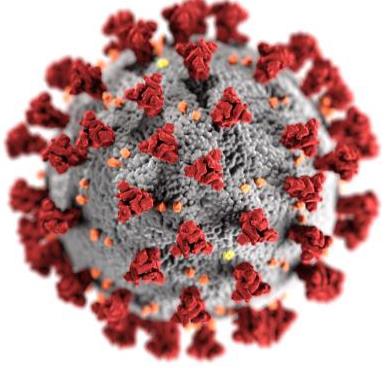
It’ll likely be “a layered process,” said County Administrator Jason Molino in his weekly hour-long conference call with local town, city, and village officials. He termed it a process based on “need, readiness, and priorities.”
On March 13th, Molino declared a Tompkins County state of emergency, approximately one week after Governor Cuomo had declared the same statewide. Since making those declarations, schools have closed, local colleges have chased away students to online learning, and the Greater Ithaca commercial and hospitality industry has slowed to a virtual crawl.
Although the Governor has extended most of his Executive Orders until May 29th—the many edicts which underpin local shutdowns, masking orders, and bans on group gatherings of any size or for any purpose—the State’s chief executive has given inklings that some restrictions may be poised for cautious relaxation, providing, of course, that the COVID-19 pandemic can be contained.
Administrator Molino joined those who’ve speculated that regulatory easing might first occur upstate, in counties like Tompkins, communities far less affected by the virus than those in or near New York City.
There may be “some regional approaches from the State,” Molino told the telephone conferees.
Amidst the County Administrator’s cornucopia of millennial buzzwords, terms like “metrics,” “milestones,” and “granular” approaches, the message sent mayors and town supervisors Thursday was that of incrementalism and restraint.
The “milestones” required for reopening, said Molino, involve the assurance of proper “density, distancing, and PPE (personal protective equipment).” Once County government reaches those goals, he said, it can begin a “reconstitution of operations,” a modern way of saying “reopening.”
Ithaca Town Supervisor Rod Howe asked whether reopening might require the routine measurement of employees’ temperatures.
“It’s not going to be a main factor in reopening,” answered County Public Health Director Frank Kruppa, though he conceded temperature-taking might be employed in “high-risk facilities,” like nursing homes.
Molino confirmed that the State Health Department, with little local notice or coordination, began limited COVID-19 antibody testing locally two days earlier. The administrator conceded he didn’t have “a lot of information” about it.
And though the State has now reportedly chosen to permit pharmacies to administer tests for the coronavirus, Kruppa advised conferees that no local pharmacies plan to participate.
Of the many questions asked during the morning conference, the query holding greatest local impact was one Molino could not answer: Will Cornell and Ithaca College bring back their students this fall?
With both institutions placing summer sessions online and university administrators unwilling to commit to their plans beyond early-August, Molino could only say is that it’s an issue they’re “all struggling with.”
There may be 2020 commencements in August, he suggested. Or then, again, maybe not.
###
Enfield Board calls upon State, City to change NY 79 Detour
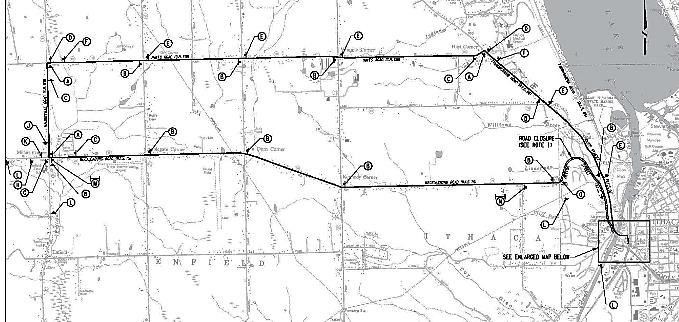
by Robert Lynch, April 29, 2020; updated April 30, 2020:
“Blind hills,” high speeds, and a dangerous intersection that’s already claimed a life. It’s “very anxiety-inducing.”
The words of Hayts Road resident Ryan Griffin, one of several who spoke out Wednesday (April 29th) and prodded the Enfield Town Board to urge the State Department of Transportation and Ithaca Department of Public Works to reroute its Route 79 detour away from Enfield’s Hayts Road, a detour put in place earlier this month to enable reconstruction of the City’s Hector Street.
In a break from the dissention and rancor that characterized its recent sessions, the Enfield Board found consensus Wednesday and adopted a Resolution, offered by Councilperson Robert Lynch (this writer) urging State and City highway engineers to reroute NY 79 eastbound traffic at Sheffield Road rather than at its current exit, farther west, at Halseyville Road.
The shorter Sheffield Road detour would avoid an approximate three-mile stretch of Hayts Road, between Halseyville and Sheffield, a path that includes two dangerous intersections with limited visibilities and many blind driveways.
Near one of those crossings, at Hayts and Van Dorn Road North, an 82-year old pedestrian, Carmen Jacks, was killed August 10, 2018, struck by an eastbound car as she crossed Hayts Road after visiting her mailbox.
Police reports at the time blamed “pedestrian error.” But neighbor Griffin was not persuaded.
“They ticketed her in her own death,” Griffin asserted Wednesday before the Town Board.
The State DOT and Ithaca DPW imposed the out-of-the-way Route 79 detour stretching far into the heart of Enfield with little prior notice or opportunity for the Town’s input. In email messages exchanged with Councilperson Lynch last week, John Licitra, the City of Ithaca’s point person on the project, referenced a May 2018 “community meeting” held to discuss the Hector Street project. But Enfield Supervisor Beth McGee, who held office then as now, Wednesday recalled no involvement of her Town in that discussion.
At Wednesday’s meeting, neighbor Cathy Rogers rattled off as many as four improvements she’d like to see: The Sheffield Road detour; or if not, a reduced speed limit, installation of a “blind driveway” sign, and more police patrols.
Albert Vill, who now lives in the same house as did Ms. Jacks, described for the Board the blind Hayts/Van Dorn intersection as “incredibly dangerous.” Vill suggested that either short- or long-term, a four-way stop should be imposed. The “30-second delay,” said Vill, is “a small price to pay.”
Lynch’s originally-submitted Resolution would have urged highway engineers to consider four-way stops and/or reduced speed limits as well as “comparable traffic calming devices” should they reject the Sheffield Road rerouting. But at Supervisor Beth McGee’s urging, the Board stripped those back-up choices from the Resolution amid McGee’s worry that too many alternatives would give traffic planners more reason to keep the present detour in place.
Licitra, the City DPW’s Sidewalk Program Manager, told Lynch that planners chose the farther-west Halseyville Road turn-off, rather than the Sheffield Road exit, because, “Sheffield Rd has some sight line limitations at the intersection of NY 79,” while “Halseyville Rd is considered a safer alternative than Sheffield Rd as recommended by the Tompkins County Highway Division.”
The Town of Ithaca, a minor participant in the Hector Street reconstruction, rejected sending NY 79 traffic down Westhaven Road and other Town-owned roads “because they were not designed/constructed for heavy vehicle use.” The State, meanwhile, rejected using Route 327 as an alternative due to the detour’s length.
Lynch’s adopted Resolution maintains that any problems at Route 79 and Sheffield “can be ameliorated by appropriate signage and/or traffic controls at that intersection.”
Known as the Hector Street Complete Street Project, the multi-faceted reconstruction will rebuild retaining walls, install curbing, storm drains and sidewalks from Floral Avenue to just past the city line. Construction—and the detour—may last through early-October.
With Councilperson Mimi Mehaffey excused, the Hayts Road resolution passed unanimously.
An expected hot-button issue for the Board, namely the consideration of longer terms of office for Town Supervisor, Highway Superintendent, and Town Clerk, as well as the potential transition of the highway chief and Clerk to appointive positions, was waived off until May 13th, mainly so that Mehaffey could take part. Councilperson Lynch urged the postponement. Supervisor McGee initially declined to delay discussion, saying no immediate votes were expected. But she later agreed to set the matter aside the extra two weeks.
Note: This story updates certain facts from those previously reported.
###
COVID-19 infects Tompkins County with an $11 Million budget shortfall
by Robert Lynch, April 28, 2020
How much will COVID-19 leave Tompkins County’s budget in the hole?
Imagine that you’d have to fire the entire Sheriff’s Department and shutter the jail to fill the gap. Or you could lay off close to 100 county employees. Or, perhaps, you could raise the property tax by nearly 23 per cent.
County Administrator Jason Molino drew upon those hypotheticals Tuesday (April 28th) to dramatize the severity of the pandemic’s projected impact on this year’s Tompkins County budget, which by the Administrator’s projections will run an $11.8 Million revenue shortfall by year’s end.
For more than two hours Tuesday Molino chronicled his dire financial forecast and fielded lawmaker’s questions as the Tompkins County Legislature met for what’s usually called its annual springtime budget “retreat.”
In a normal late-April, County lawmakers would stretch the rules and convene quietly to ponder the following year’s finances sheltered quietly away from press and public. But this is not a normal year, and a 2021 budget has become at best a wild guess. Tuesday’s focus remained on the County’s current budget and how officials can best wash away the stain of red ink from now through December.
“The impact is greater than 9/11 or the 2008 recession,” Molino warned the 14 legislators in an online presentation accessible to all.
“I am sobered by all this,” responded Budget Committee Chair Martha Robertson to Molino’s best-guess calculations. And with no vaccine in sight and a “new normal” setting in, Dryden’s Robertson suggested the COVID-19 economic fallout may linger through 2022 or 2023.
But Robertson’s Ithaca colleague, Shawna Black, drew from Molino an even more portentous warning. The Administrator conceded to Black that his projections assume a prompt return of local college students for future semesters.
“I don’t know how not to assume it,” Molino said of students’ return. “But if they don’t return, it (the financial fallout) will be severely different.”
In so many ways, from so many places, the COVID-mandated shutdown has cut Tompkins County’s sources of formerly-predicted revenue. Molino forecast a 15.4 per cent, or $5.6 Million, cut in sales tax receipts, a 30 per cent reduction in hotel room tax revenue, and a 15 per cent drop in aid payments from cash-strapped Albany.
With at-home workers buying less gas, those laid off reducing their online purchases, and restaurants, the County’s prime sales tax cash cow, darkened by Executive Order, the sales tax picture remains particularly painful. And the restaurants “are probably not going to recover very well,” Molino cautioned.
To enact short-term triage, Molino’s budget axe will slice aplenty. All but four of the County’s 32 vacant positions on its 770-person payroll will likely remain unfilled. A planned luxury hire envisioned last fall, a $125,000 Equity and Diversity Officer for the County’s employees, will stay vacant for another year. A Half-Million Dollar expenditure to design a new Downtown office Building will similarly be shelved, pushing that project back a year. And many of the agencies that contract with the County will see their third-quarter funding cut by 25 per cent, and likely thereafter as well.
What remains, Molino admits, is the remaining workforce. He and lawmakers easily bandied about a 90-person worst-case layoff projection. Early retirements, warned Molino, remain an option. So, too, he said does the “review of current and retiree health insurance.”
Tompkins County’s one financial lifeline is its “unassigned fund balance,” pegged by officials Tuesday at $34 Million. Since the County is legally barred from raising property taxes further this year, and cannot simply borrow to pay day-to-day expenses, lawmakers were told as much as $7 Million of that reserve might need to be tapped this year alone.
“What is a fund balance for if you don’t use it in a financial crisis?’ said Ithaca legislator Rich John.
But John’s Dryden colleague, Mike Lane, urged restraint. “Be very cautious about how you use your cash balance,” warned Lane. “You may have to raises taxes,” or even impose a “surtax” for one year.
###
Is it the “Dump Buddy” bill?
McGee proposes changes to make Highway Super. and Clerk’s Offices appointive
by Robert Lynch, April 24, 2020

Less than two days after she and other Town Board members sparred with Highway Superintendent Barry (Buddy) Rollins over his staffing decisions amid fears of COVID-19, Enfield Supervisor Beth McGee proposed Friday (April 24th) a set of five alternative revisions to Town terms of office, one of which would cut Rollins’ current term in half and make the highway position appointive.
McGee’s options, sprung upon some Town Board members at noontime Friday without prior notice, also proposed converting the Town Clerk’s office from elective to appointive, and extending the Supervisor’s term from two years to four, effective with the next election.
Any of the proposals, to become law, would require a Public Hearing, Town Board action, and a mandatory public referendum, likely this November.
The topic “Appointed/Elected/Term Extension Proposals” is listed for discussion at the Town Board’s April 29th meeting, though the Supervisor has yet to request action then.
“These proposals are offered based on requests from residents over the last two years, as well as Town Board discussions last year, and comments by candidates during the last elections,” McGee stated as she discussed her proposals on an Enfield Democrats’ online chatroom late Friday, hours after first unveiling them to Board members and other elected officials.
But the timing of the Supervisor’s action caused some to question McGee’s motivation in light of her heated exchanges with Highway Superintendent Rollins Wednesday, when she and the Board’s majority held firm to their decision to put on “partial unemployment” highway workers whom Rollins had idled amid fears they might contract COVID-19. The Highway Superintendent, in strong terms, had objected to the Board’s action.
Most controversial of McGee’s options would allow the Town Board, with voter consent, to cut short the two-year term of office to which Rollins was elected last November. Under that option, the elective position would end this December and be replaced January first by a Superintendent appointed by the Town Board.
A similar proposal would cut short the elective position held by Town Clerk Ellen Woods and make her job appointive also. Less radical options would allow each officer to serve out his or her term, but be replaced by appointees in 2022.
“An approach whereby the terms end December of 2020 gives residents and the Town Board an opportunity to make these changes more immediately if voters think it’s necessary to better serve the needs of those who live in the Town,” McGee stated in discussing the options to early-end the elective terms of highway chief and Clerk. But the Supervisor cautiously declined to state her public preference between the choices.
Others declined to be so reticent.
“I will vote ‘NO’ to these Resolutions,” stated Councilperson Robert Lynch (this writer), blindsided by McGee’s suddenly-announced initiative. “Do not attempt to vent your grievances against a duly-elected public official by simply abolishing his job, Beth,” Lynch said, referencing the Supervisor’s Wednesday argument with Rollins.
“Your suddenly-announced proposal is totally uncalled for in this moment of crisis. And this is the surest way for this community of wonderful citizens to turn against you and count the days until you will be replaced (by someone) in November 2021,” the Councilperson added.
The package of elective office changes—perhaps the most sweeping in Enfield’s history—would, with prior voter approval, extend future terms of office for McGee’s own job, Town Supervisor, from two years to four. McGee may not directly benefit from the revision, since it would only “apply to the person elected after January 1, 2021.” The incumbent’s current term runs through the end of that year. The proposal remains silent over what would happen should McGee resign early and someone else fill her seat for the remainder of 2021.
McGee briefly broached the four-year Supervisor’s issue last year, at which time action could have enabled her to serve four years following her reelection last November. McGee quietly dropped her idea at mid-year, following Lynch’s objection that her action stood as an attempt to “aggrandize” supervisory power.
Reminded by McGee that he’d in January suggested that the Board “re-visit the issue of extended 4-year terms for Supervisor” and other offices, Lynch answered that the pandemic changed everything. What’s more, he said, McGee’s recent squabbles with Rollins make this “absolutely the wrong time” to strip the Superintendent of his elected office.
“Whatever your intent was in submitting this measure, the timing was horrendous, and our Town’s citizens will suspect simple vindictiveness, even if that is not the case,” said Lynch, reaffirming his opposition.
Yet, in defending her proposals and an eventual referendum, McGee advised fellow Democrats, “The bottom line with these proposals is that there is no more Democratic action for this Town Board to take than to move out of the way and let Enfield voters determine what they want.”
View the text of Supervisor McGee’s proposed term-of-office options at: http://townofenfield.org/wp-content/uploads/2020/04/Appointed-Elected-Term-Extension-Proposal-2020.pdf
###
37,000 State-made Masks … such as they are
County Administrator says cotton is coming… but only for those deemed “essential”
by Robert Lynch, April 23, 2020
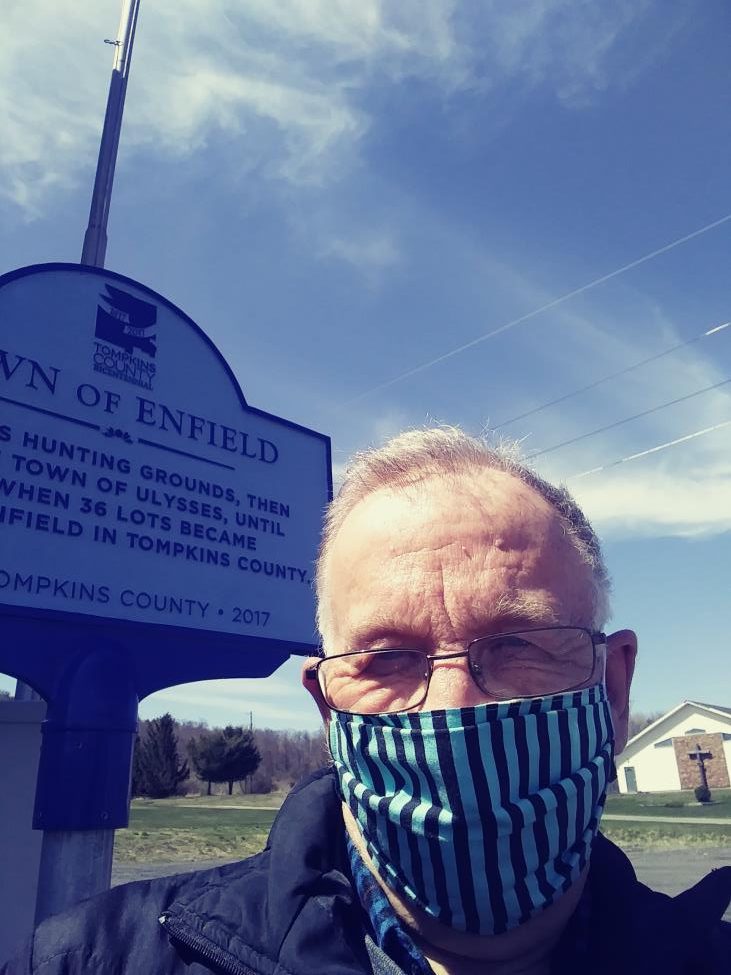
“Masks will be an accepted addition to our everyday lives,” predicted Tompkins County Administrator Jason Molino Thursday (April 23rd) as he assured local officials that Albany has dispatched to the county a shipment of 37,000 cloth face masks earmarked for “essential workers.”
In his weekly 45-minute morning conference call with village mayors and town supervisors—including Enfield’s—Molino said the state’s shipment will be complemented by those produced by local mask-makers, volunteers who have set up a makeshift sewing center in the T-C-T BOCES gym.
Molino’s advice suggested that if your mask comes from a local sewer, you’re among the lucky.
The State’s masks are “not high quality,” the Administrator warned, predicting they’d only survive a few weeks of machine washing.
Meanwhile, Molino indicated blue drop boxes are being positioned around the county to permit volunteer mask-makers to deposit their home-made masks for distribution to those who need them for their work. One drop-box will be placed outside the Enfield Town Hall.
Molino stated that the County will limit distribution of all governmentally-held masks, including those from the State, to “essential workers,” those required to report to their jobs despite the Governor’s stay-at-home Executive Orders.
Since Friday, April 17th, Governor Andrew Cuomo has required nearly everyone who goes out in public and cannot maintain a proper social distance, to have nose and mouth covered. Those in commercial work or public service were issued a stricter order earlier.
Molino acknowledged that the restricted mask-issuing policies preclude distribution to persons not doing essential work and require them to make their own masks at home or otherwise improvise.
Although County Health Department statistics this week indicated virtually no rise in local cases of COVID-19, Administrator Molino and Public Health Director Frank Kruppa Thursday declined to relax their earlier-issued stay-at-home guidelines or to provide firm timetables as to when businesses and public services might reopen.
Responding to Ithaca City Alderperson Seph Murtagh’s query, Molino said, “As we closed down, I would expect the same approach as we open up.” Molino’s allusion to a phased reopening, however, failed to recognize that most shut-down orders have come abruptly in statewide mandates from Governor Cuomo.
Freeville Mayor David Fogel pushed back on Health Director Kruppa’s earlier strongly-worded “recommendations” that quickly closed most local playgrounds and mandated social distancing on recreational trails.
Fogel urged Kruppa and Molino to “tweak the messaging” to make it “a bit more positive, a bit less authoritarian.”
Kruppa responded that he’d never shut down the trails completely, but stood reluctant to revise his prior recommendations for fear of “mixed messages.”
“Nuances can sometimes prove difficult,” Kruppa cautioned.
###
Enfield Board critical of Highway Chief’s return-to-work plans
by Robert Lynch, April 22, 2020
It all may depend on how you define “essential work.”
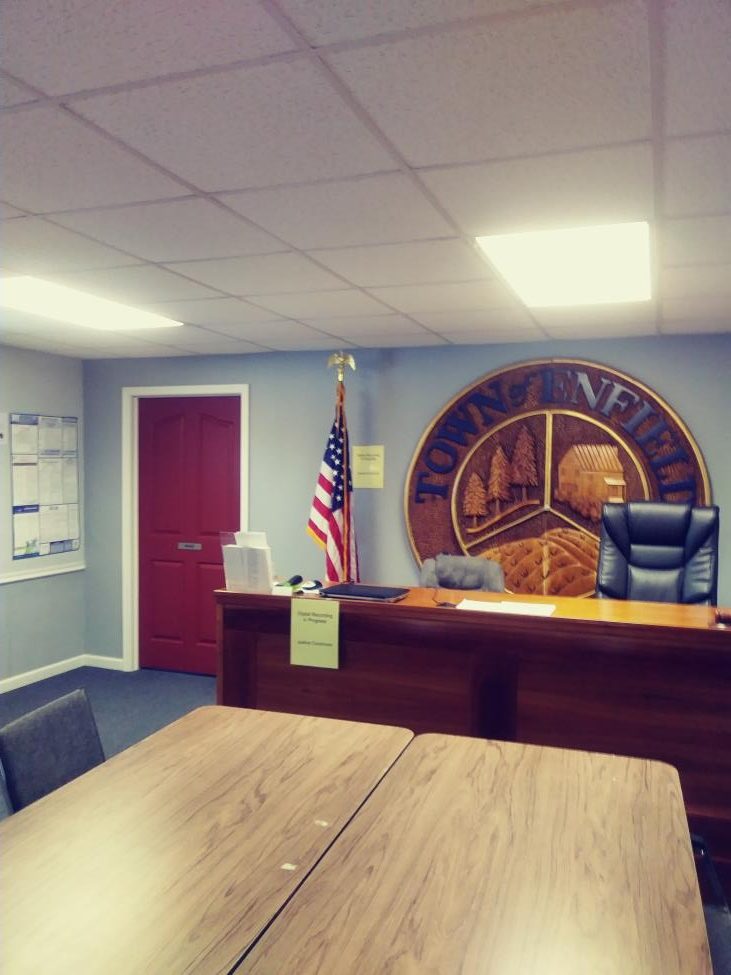
In yet another contentious Town Board meeting—the second one in as many weeks—the Enfield Supervisor, Highway Superintendent, and various Board members wrangled Wednesday (April 22nd) over the work rules and source of pay for the town’s highway workforce, men largely idled since mid-March amid fears of COVID-19.
In a letter to Board members circulated just hours before the online meeting convened, a letter read aloud at Highway Superintendent Barry (Buddy) Rollins’ request, Rollins announced that his department will “be resuming essential work beginning April 26th.”
“I will be certifying the payroll and submitting it for payment as required by law. [I] note that this action is consistent with the past practice of the town,” Rollins wrote.
In the letter’s close, the highway chief faulted Town Board members for micromanaging his operations.
“In the future, it will be appreciated if the town board would tend to their own business and leave the highway business to the duly elected highway superintendent to take care of like I have for the last 12 years,” Rollins concluded.
One week earlier, the Town Board’s majority, over Rollins’ objection, had ordered Enfield’s five Highway Department subordinates be placed on governmentally-paid “partial unemployment” for any hours they failed to work. The Board’s decision altered Rollins March 18th directive that workers stay home and report only when called upon so as to protect them from the coronavirus.
Though at least one Councilperson thought the latest decision had resolved the impasse, Supervisor Beth McGee and others did not. They cautioned that the Superintendent’s assurances left unanswered what work Rollins would classify as “essential,” and how many of his workers he would call back to perform it.
Over McGee’s objection, Rollins argued that partial unemployment equated to a layoff. And when members insisted that the Town wouldn’t pay for hours not worked—including for workers kept home on so-called “COVID-time”—the Highway Superintendent retorted “You’ll pay what I tell you to pay.”
Councilperson Robert Lynch (this writer) concluded that the question boils down to one of “separation of powers.” And based on Lynch’s own review of prior cases, supported by the opinion of Rollins’ quoted lawyer, the Councilperson maintained that the Board’s role stops at the allocation of funds. The Highway Superintendent, Lynch contrasted, has full “operational” control, including over how many of his staff are deployed and when.
Amid raised emotions and heated exchanges, the Board declined to revise the employment policy it had enacted one week earlier. Nor did it further limit a recently-adopted purchasing freeze so as to make it harder for Rollins or others to spend moneys for supplies without Board approval.
At an emotion-laden moment, Lynch reminded members of one citizen’s comment at the meeting’s start, Tammy Alling faulting some on the Board for “constant badgering, badgering, badgering.”
In other action, but with much less controversy, the Town Board ratified Town Clerk Ellen Woods’ hiring of Patricia Speno as her deputy, Speno to serve for $10,000 annually, a $3,000 increase from the amount earlier budgeted.
“It’s a little bit of a hit, but a worthwhile hit,” Lynch said of the increased funding’s budget bite. In his support, Lynch praised Speno’s qualifications, and observed that Clerk Woods clearly deserves an assistant.
But while one position was filled, another fell open. Supervisor McGee announced that Town Bookkeeper Debbie Kelley will resign effective May fourth. Kelley’s letter gave no clear explanation for her sudden departure.
McGee disclosed that she and Councilperson Mimi Mehaffey have already begun soliciting offers from payroll services to undertake part of Kelly’s financial duties, though a replacement bookkeeper will still be needed.
And near meeting’s end, the Supervisor returned to the hot-button issue of last week’s meeting, the expansion of the Deputy Supervisor’s position. McGee took Councilperson Lynch to task for his reporting (on this website) that delegation of check-signing duties to the deputy was somehow relinquishing McGee’s own financial role.
At the Board’s March 5th meeting, McGee had said of her financial duties, “I’m not going to do the Budget Officer’s Position… I don’t care how this turns out. I’m not doing that.”
But Wednesday, her tune had changed. Brusquely scolding Lynch to correct the record, McGee said, “I’m not relinquishing anything,”
###
Tompkins Lawmakers push aside Rent Holiday Bill
by Robert Lynch, April 21, 2020
It sounded good. It looked simple. But the Tompkins County Legislature Tuesday (April 21st) tossed to committee—and likely killed—its proposed endorsement of a State bill that would grant many residential tenants, small businesses, and some landlords a 90-day rent and mortgage forgiveness holiday to cushion the economic shock from COVID-19.
By a nine-to-five vote, the County Legislature delayed action on member Henry Granison’s proposal to back measures pending before the State Senate and Assembly that would suspend for 90 days residential and small business rent payments by anyone “that has lost income or has been forced to close their place of business as a result of government ordered restrictions” to combat the coronavirus. The forgiven funds would never need to be paid.
A second prong of the bill, one benefiting many landlords, would grant 90-days of mortgage forgiveness for any person “who faces financial hardship” as a result of being deprived of those unpaid rents. The effect of the two-pronged rental and mortgage holidays would force lending banks to shoulder most of the burden.
“The coronavirus has hit very tough, very hard,” warned Granison, who said that at least in his City of Ithaca, about three-quarters of the units are rentals.
The State Legislature’s simple, short measure, sponsored in the Senate by Michael Gianaris of Queens, appeared headed toward routine Tompkins County endorsement until legislator Anna Kelles stepped in to caution that the bill is likely unconstitutional.
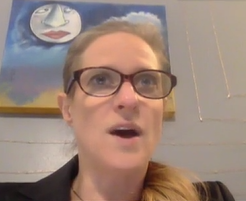
“It will not move forward,” Kelles predicted, warning Granison that what he favors is likely to dead-end in the State Legislature, and if not there, the courts.
The problem, Kelles explained, is that rent and mortgage forgiveness would run up against constitutional restrictions on eminent domain. “Government would be forcing non-payment,” she said. The banks, the ultimate losers in Gianaris’ initiative, would take the financial hit.
Supporting referral to committee, Kelles suggested the County Legislature might, instead, back an alternate bill, one much longer and more complex, one that would “implement a program of rental assistance in the form of emergency vouchers.”
The major obstacle for this latter bill, however, is its cost. The bill’s own language admits that the rental assistance plan, “is subject to the appropriation of (State) funds for this purpose.” And as many lawmakers and analysts observe, COVID-19 is leaving the Empire State nearly broke.
Faced with that grim reality, Granison encouraged his colleagues to make at least a “symbolic move” and back his measure regardless of the outcome.
“It’s new to me,” the Ithaca lawmaker said of Kelles’ constitutional warnings. Granison urged the local body proceed regardless so as to show that “we support renters.”
But “we have to support landlords,” too, answered Dryden’s Mike Lane, who reminded his colleagues that many landlords are private homeowners leasing duplexes, using rental income to pay their taxes.
“I don’t want my tenants to be out on the street,” chimed in Lansing’s Mike Sigler, who rents properties himself. “I’ll work with them,” he said, describing property leasing as “a service, just like any other.”
Legislator Deborah Dawson indicated Kelles’ legal argument likely changed her vote to favor of dispatching Granison’s resolution to committee. Said Dawson, “As much as I want to support tenants, we also have to support the Constitution.”
###
Mandate before Material; Tompkins leaders struggle to meet Cuomo’s mask-up order
by Robert Lynch, April 16, 2020
Confronting a suddenly-declared gubernatorial Executive Order that will require virtually everyone at close distances to wear face masks in public as soon as Friday night, Tompkins County officials Thursday morning (April 16th) conceded that too few will likely have such facial coverings without first searching the scarf drawer.
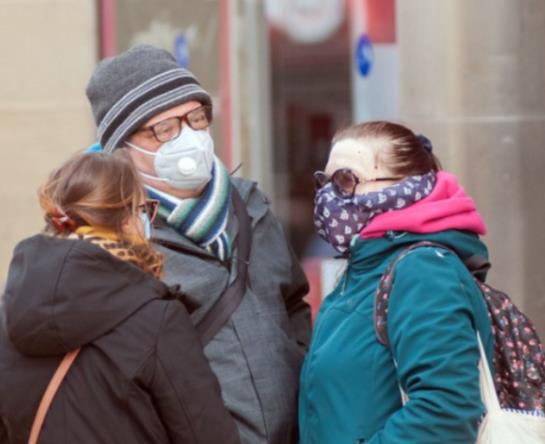
“We’re not likely to produce enough masks,” warned Tompkins County Public Health Director Frank Kruppa, on his weekly Thursday conference call with local municipal leaders. Kruppa referred to volunteer efforts to sew cloth masks soon required to be worn by most in public.
“Everyone should be prepared to do with what they have at home,” Kruppa added, the Health Director suggesting people use cloths or bandannas to cover their noses and mouths to prevent the possible spread of COVID-19 germs by those potentially infected, though asymptomatic.
In a classic example of governmental regulation leaping ahead of merchandise availability, Governor Andrew Cuomo on Wednesday, in his latest of 17 COVID-19-related Executive Orders, directed that effective at 8 PM, Friday, April 17th, “any individual who is over age two and able to medically tolerate a face-covering shall be required to cover their nose and mouth with a mask or cloth face-covering when in a public place and unable to maintain, or when not maintaining, social distance.”
On Wednesday night, April 15th, per an Easter Sunday Executive Order, all employees remaining on the job in essential businesses “shall wear face coverings when in direct contact with customers or members of the public.” The Sunday Order specified that the workplace masking rule “may be enforced by local governments or local law enforcement” as though it violated Public Health Law. The Governor’s more recent mandate for the general public did not specify an enforcement tool.
“It’s nice we live under a dictatorship,” Enfield Councilperson Robert Lynch (this writer) blurted out in anger and frustration as he first learned of Cuomo’s general public mandate while attending Wednesday’s Town Board meeting, Lynch informed by fellow Councilperson Mimi Mehaffey, co-owner of Collegetown Bagels. Lynch’s words appeared to stun his colleagues at the online session.
Following up during the next morning’s conference call, Lynch quizzed Kruppa as to what enforcement mechanisms local officials intended to employ. Would police, Lynch asked, be chasing persons not wearing masks down the Ithaca Commons?
Kruppa responded that such heavy-handed enforcement stands unlikely. Instead, he said, authorities are more likely to have “a conversation” with the offender and urge compliance.
The Health Director made clear that home-made or commercially made masks are not designed to protect the wearer from contracting the coronavirus, but rather to contain the possibility of asymptomatic spread of the disease by the unwitting.
Asked by Trumansburg Mayor Rordan Hart about the true risk of asymptomatic spread, Kruppa hedged.
“I wouldn’t put a number on it,” the Director responded, referring to the likelihood of casual contamination. Rather, Kruppa said, “We have accepted the idea,” that asymptomatic spread occurs.
“My message today is please just stay home,” Kruppa said, reiterating his admonition unveiled to municipal leaders one week earlier. Kruppa further cautioned that his advice extends to urging people not to patronize drive-through restaurants or other non-essential businesses.
As of Wednesday afternoon, 118 persons had tested positive for COVID-19 in Tompkins County since daily reporting began one month ago. But of those 118, a full 90 have recovered, leaving only 28 active cases. Kruppa indicated the contagion has not yet spread to local nursing homes.
Enfield Supervisor Beth McGee asked about small indoor or outdoor gatherings, also banned by an earlier Executive Order. McGee asked the Health Director to put a number on how many is too many.
“The official number is ten,” the Director responded, even though the Governor’s ban extends, by its language, to “non-essential gatherings of individuals of any size for any reason.”
But unofficially, Krupa told McGee, he wants the number to be as small as possible. Just “stay home,” he said.
###
Enfield Board expands Deputy Supervisor’s post; puts highway crew on temporary unemployment
by Robert Lynch, April 15, 2020
In a contentious three-and-a-half -hour long online meeting that saw tense exchanges between Supervisor Beth McGee and both Highway Superintendent Barry (Buddy) Rollins and one Councilperson, the Enfield Town Board Wednesday (April 15th) vastly expanded the role of the Deputy Supervisor, elevated Councilperson Stephanie Redmond to that position, and voted to place the town’s highway workers on “partial unemployment.”
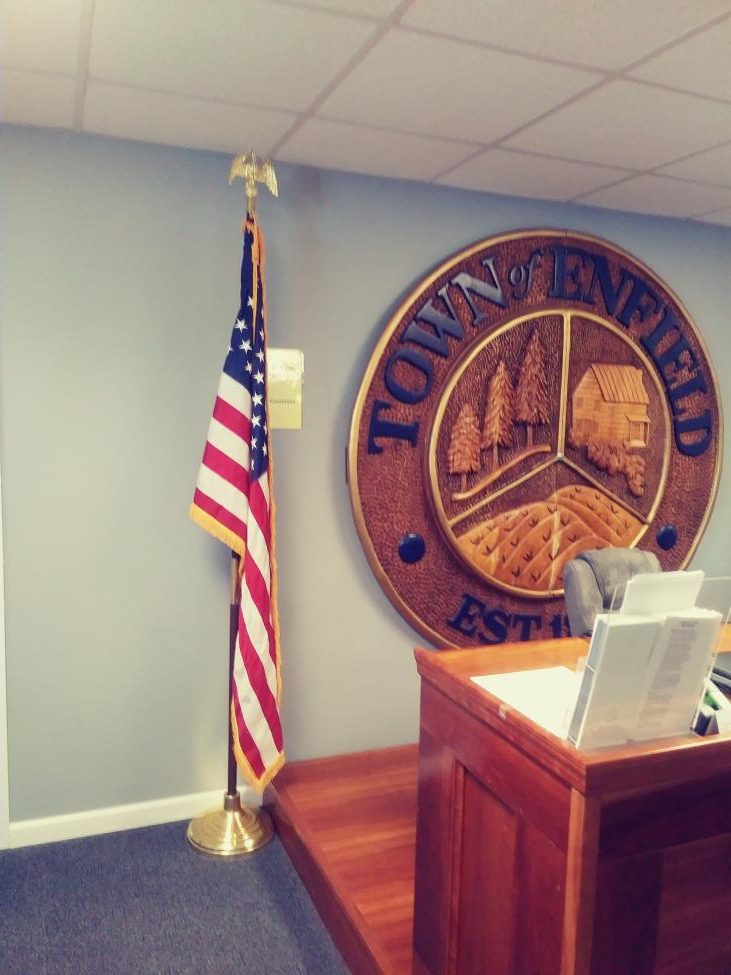
At Supervisor Beth McGee’s initiative, Redmond, who took office as Councilperson only last January, will replace former Councilperson Becky Sims as McGee’s deputy, with the Deputy Supervisor’s pay raised from $800 to $10,000. Even though the Town faces financial uncertainty amid the COVID-19 crisis, the Board transferred $9,200 to fund the deputy’s compensation from a budget line termed “General Fund Savings.”
In her elevated role, Redmond will be added as a signatory to the Town’s financial accounts, taking on some of the responsibilities McGee had made clear in early-March that she wanted to relinquish.
The Town Board approved the Deputy Supervisor’s expanded role and compensation by a 3-1 vote with Redmond recusing herself. Councilperson Robert Lynch (this writer) opposed both the Deputy Supervisor’s change and its enabling fiscal transfer, arguing the Town should not spend nearly half as much more on administrative services while taxpayers face struggles in the COVID-related economic downturn.
“It stands as the cruelest of ironies that at the same meeting at which our Town Board will consider both a Purchasing Freeze and a Hiring Freeze for all other positions, our Supervisor will ask us to pull $9,200 from the mythical magic hat of alleged “General Fund Savings” to compensate one of our own Councilpersons to do more work so that she, the Town Supervisor, may do less,” Lynch stated in a three-page open letter he’d submitted the Board and released to the public Tuesday, a letter McGee effectively compelled Lynch to read aloud near the meeting’s close.
Repeatedly, McGee insisted she needs added help to do her job and complained the Supervisor’s $20,000 annual salary stands inadequate to compensate what she maintained is a full-time job.
McGee also revealed during one monologue against Lynch that she abandoned her earlier-announced plans to resign after suspecting that Lynch, himself, would run to replace her. The Councilperson replied that he appreciated that McGee had explained her true rationale.
As for the meeting’s other hot-button issue, the Town Board adopted Councilperson Mimi Mehaffey’s initiative to place all five subordinates in the Highway Department on “Partial Unemployment,” a classification that Mehaffey stated would permit road crews to work part-time and still be compensated for those days they don’t work.
Since he first shut down his Highway Department March 18th amid COVID-19 worries, Superintendent Rollins has kept his staff on-call, using one of two per day—and often not for a full day’s shift—as needs existed. Under the revised protocols approved Wednesday by the Board, Rollins would need to schedule his men on more regular schedules.
When Rollins argued that the weather is too unpredictable for such regularity, Councilperson Redmond countered that Rollins should monitor long-range forecasts to set work duties and determine manpower needs.
Up until now, the Town has paid idled highway employees full-time salaries whether they worked or not. Rollins termed their at-home pay “COVID time” and argued only three other highway departments in Tompkins County are now working.
Mehaffey, however, said financial responsibility to the taxpayers dictated reliance on the temporary unemployment, given the extra benefits recipients now receive through federal legislation. She objected to Rollins unpredictable call-in practices during the emergency.
“I don’t know if I as a public official can do that without being accused of misusing public funds,” Mehaffey said of the work practices.
“I’m concerned about gifting public funds,” echoed Supervisor McGee, who also suggested state aid cutbacks might curtail Town spending on highway maintenance and upgrades already approved.
Rollins bristled at the Town Board’s increased operational oversight of his employees.
“I don’t need none of you to do their jobs,” Rollins remarked.
“We’re totally in line with the rest of the towns,” the Enfield highway chief added. “What do we do if one employee comes down with COVID-19? It could put us all down (in quarantine) for two weeks.”
Councilperson Lynch also opposed the Town’s transition to partial unemployment, urging his colleagues hold off until Tompkins County’s own Highway Department and/or a majority of other towns adopt the practice. Lynch quoted County Administrator Jason Molino two weeks ago as saying that furloughing public employees can be “tricky.” Lynch also warned the furloughs could damage departmental morale.
In actions also related to COVID-19, the Town Board, with less controversy, imposed a hiring freeze to address financial uncertainties and imposed a freeze on purchases of more than $1,000 for tools and equipment and $50,000 for purchases of services and materials such as highway stone. Any overruns would require Town Board consent.
###
Tompkins closes playgrounds; clamps down on outdoor recreation
by Robert Lynch, April 13, 2020
Stepping close to, but apparently not crossing over, gubernatorial-imposed boundaries, Tompkins County officials Easter weekend “recommended” all playgrounds, basketball and tennis courts and soccer fields in the county closed as part of administrators’ efforts to stem the spread of COVID-19.
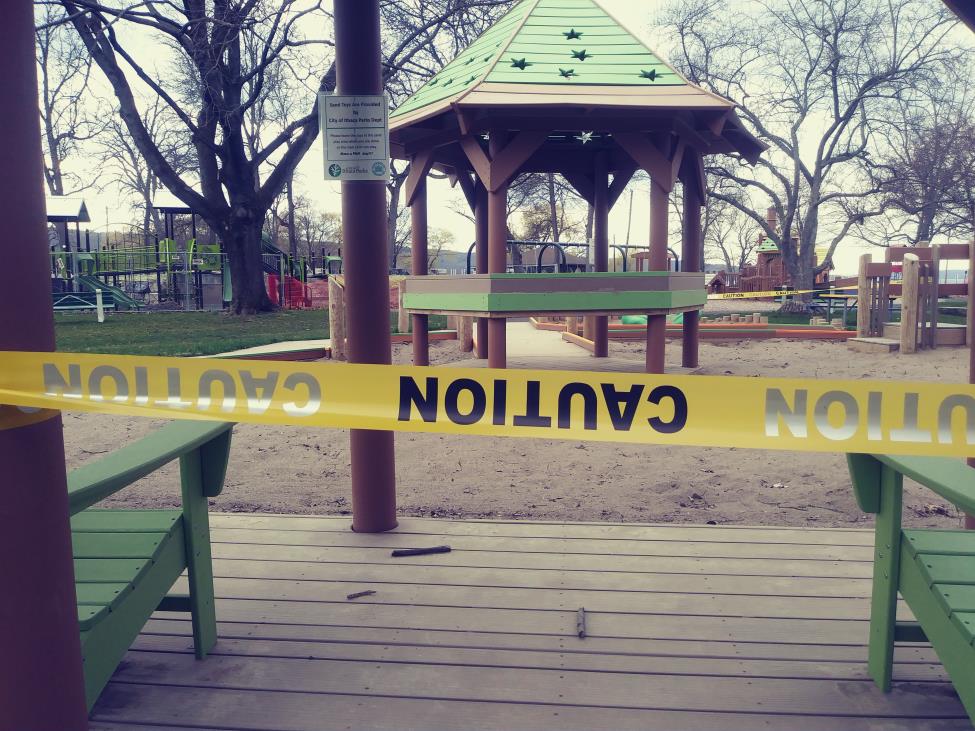
County Public Health Director Frank Kruppa’s Saturday directive came as local statistics indicated that cases of the pandemic have stabilized. The first two coronavirus deaths locally came over the weekend, but were of patients recently transported to Cayuga Medical Center from New York City.
“I am recommending the closing of recreational facilities where equipment is shared, such as playgrounds, basketball courts, tennis courts, pickle ball courts, soccer fields, etc.,” Kruppa wrote in a memo to “Recreational Facility Operators” and shared as a news release on the Health Department’s website.
“Other recreational facilities where social distancing cannot be maintained should also be closed. Social distancing includes at least six feet of separation at all times,” Kruppa continued.
The Health Director’s “recommendation”—perhaps a carefully-chosen word—followed by two days the admonition of Tompkins County Administrator Jason Molino in a conference call with local municipal officials, when he said that when it comes to public use of recreational trails, his advice is, “Stay away from them as much as possible.”
Health Director Kruppa’s firmly-worded Saturday message stopped just short of banning trail usage, his statement urging communities place social-distancing signage on trails. But Kruppa added, “On trails where the appropriate amount of social distancing cannot be achieved I recommend the municipality consider closing their trails.”
The County’s decision to strongly recommend playground closings, rather than order the closures outright, may find its basis in law, specifically in Governor Cuomo’s COVID-19-related Executive Order of March 18th, which stated, in part:
“[N]o locality or political subdivision shall issue any local emergency order or executive order with respect to response of COVID-19 without the approval of the State Department of Health.”
A search of the New York State Health Department website Monday found no reference to State-ordered playground closings. Rather that site referred visitors to the Governor’s 10-Point PAUSE policy, item six of which states: “Individuals should limit outdoor recreational activities to non-contact and avoid activities where they come in close contact with other people.”
Once before, Tompkins County officials came close to stepping on the Executive’s toes when Administrator Molino March 17th ordered the closure of most licensed child care centers, an edict not found on the Governor’s closure lists. Molino later maintained that his order survived as being grandfathered, issued one day before the Governor’s order to restrain municipal action.
Local recreation managers have generally complied with the local Health Director’s recommendation. A tour of Ithaca’s Stewart Park Easter Sunday found the tennis courts and child playgrounds taped off. However, the multi-person lakeside swings remained in use, as were picnic tables. Small groups were seen holding Easter cookouts.
Kruppa’s Saturday directive provided “suggested language” for public trail signage. The signs, he said, should urge walkers to “maintain a distance of six feet between you and others,” and “if you are passing others, continue maintaining six feet of distance.”
###
Cayuga Medical Center reports second death from COVID-19; a second transfer patient from New York City
Source: the Tompkins County Health Department, April 11, 2020
Editor’s note: As updated on the Tompkins County Health Department’s website late Saturday afternoon, April 11th, a second patient suffering COVID-19, transferred locally from New York City, has died at Cayuga Medical Center.
In announcing the first of the two fatalities Friday, April 10th, as posted on the Health Department’s web page, the following:
Statement from Dr. Martin Stallone, CEO, Cayuga Health System:
“It is with deep regret that we announce the passing of a patient at Cayuga Medical Center due to COVID-19. Our team has trained extensively for treating patients with the virus. N.Y. Governor Andrew Cuomo announced that upstate hospitals would be receiving patients from New York City. Earlier this week, we received a compassionate transfer of two patients from New York City. Unfortunately, one of those patients passed away this morning. Our hearts go out to the patient’s family during this difficult time. We would also like to recognize the dedication of our Cayuga Health team that continue to treat COVID-19 patients locally and in New York City. They remain well prepared and committed to their calling and commitment of treating all patients, no matter what the diagnosis.”
Then, following the second death, this announcement, posted Saturday:
Statement from Leslyn McBean-Clairborne, Chair, Tompkins County Legislature, April 11, 2020:
“On behalf of the Tompkins County Legislature, I want to express sincere condolences to the family grieving for the loss of their loved ones from COVID-19. Every loss caused by this devastating virus has an impact. I know that our community will join me in prayers and condolences for the patients’ family and in doing our part to stop the spread of COVID-19.
“Cayuga Health System has prepared diligently for our community response to this virus, and acted with compassion treating fellow New Yorkers here in Tompkins County. We’re all New Yorkers, and we all have a role in stopping the spread and caring for others during this increasingly difficult time”
###
Tompkins leaders discourage trail walking as COVID-19 rules tighten
by Robert Lynch, April 9, 2020
The critic might ask, “Is it a solution for which there is no problem?”

As testing statistics point to Tompkins County’s flattening the curve on COVID-19—supported by data showing active cases of the disease locally on the decline—the County’s Administrator and Public Health Director Thursday pressed for even tighter social distancing restrictions, including discouraging people from walking recreational trails.
“We’re changing our messaging,” County Administrator Jason Molino announced near the start of his weekly conference call with local mayors and town supervisors. In what might be termed Messaging 3.0—it tends to change weekly—Molino told conferees his current directive is simply to stay at home; travel outside only for groceries, medical appointments, and pharmaceuticals; avoid all non-essential travel.
Asked about walking recreational trails, Molino said, “Stay away from them as much as possible.”
Neither Molino nor County Public Health Director Frank Kruppa went so far as to ban trail hiking, but their comments left open that possibility in the future.
“As Health Director, I’d be the last to tell people not to be active,” said Kruppa. “But if I get more complaints about trails, we may have to use additional messaging.”
Some may see “messaging” as code for regulation.
Officials indicated that some persons strolling trails or using public parks have failed to practice proper social distancing. One municipal leader wondered aloud whether rules would eventually discourage residents from walking the sidewalk.
Molino’s repeated response, “We want people to stay at home.”
The Administrator admitted that state park officials have not yet weighed in on what limits they may impose. To Ithaca Mayor Svante Myrick’s question as to how individual municipalities should handle their own parks, Molino advised leaders it should remain an “individual decision.”
A Thursday call participant, County Legislator Anna Kelles, who’d earlier urged people to walk trails as an antidote for cabin fever, interjected that new studies recommend greater social distancing for those using trails. Kelles’ cited data suggests as much as 15-foot separations for in-line walking and as much as 32 feet for runners or slow bikers.
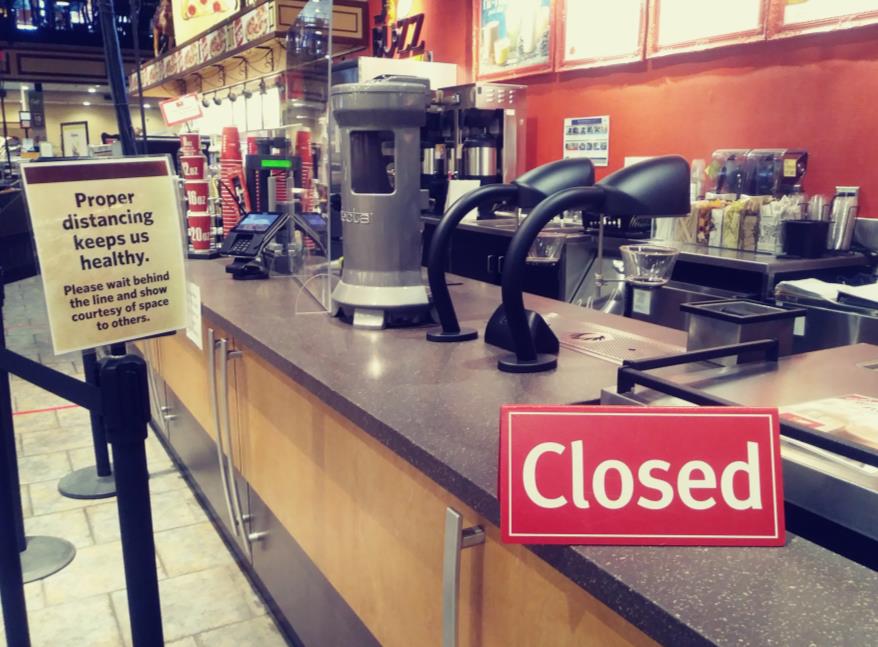
Meanwhile, Health Director Kruppa reported that initial results from those tested following their potential exposure to a COVID-contaminated employee at Ithaca’s Wegmans Coffee Shop indicate they may have dodged the bullet.
Acting upon the Health Department’s advice, many of those who’d had potential contact with the Wegmans employee swarmed Cayuga Health’s Lansing Mall testing site on Monday. A record 455 visited that day. But as results filter back, Molino reported that just two persons had tested positive for the disease, along with “a lot of negatives.”
“There probably was not a lot of community spread,” Molino concluded.
Overall, as of Wednesday, the Health Department reported 105 county residents had tested positive for COVID-19 since testing began. Five people remained hospitalized. But no one has yet died, and an increasing number of those 105 positive-testing patients have since recovered. Only 32 active cases remain, and the figure tends to shrink daily.
Mayor Myrick inquired as to how many positive-testing patients reside in particular municipalities, noting that Broome County has released similar data.
“We’re not releasing that,” answered Kruppa. “We’re a small community,” and “we wouldn’t want people in some parts of the county to think they’re safer than others.”
For identical reasons, the Health Director refused one week earlier to break down patient numbers by age or gender.
Though Governor Cuomo’s most recent Executive Order authorizes imposition fines of up to $1,000 for violation of social distancing rules outside the home, county officials told mayors and town supervisors Thursday they’d use the police as only a last resort.
Said Kruppa, “We hope education will be enough.”
###
Idled Enfield highway workers to return to work
by Robert Lynch, April 8, 2020
The Town of Enfield’s road maintenance crews will soon return to work in full force amid the risks of COVID-19, despite earlier fears of contamination that prompted the Highway Superintendent’s nearly complete shutdown of his Department in mid-March.
Following discussions with the Town Board Wednesday (Apr. 8th) during its second online meeting in as many weeks, Highway Superintendent Barry (Buddy) Rollins agreed to return his six-person staff to complete strength beginning Monday, April 13th.
Rollins shut down his Highway Garage to the public and restricted his crew to on-call status March 18th after complaining of insufficient hand sanitizer and protective supplies at the highway barn. Others in Enfield Government, including several Board members, had maintained the Highway Department stood exempt from Governor Cuomo’s strict work-from-home mandates, as highway maintenance qualified as an “essential” service.
At the beginning of Wednesday’s discussion, Rollins informed the Board that he expected his Department to be back to 50 per cent of full time status by the 13th. But some on the Board suggested they’d prefer 100 per cent redeployment, and Rollins agreed. He said a few of his men were already back on duty this week, patching potholes.
Enfield Councilperson Mimi Mehaffey had been most critical of the Department’s prolonged shutdown. “It’s not financially responsible” to keep the crews idle, Mehaffey told her Board Wednesday.
Supervisor Beth McGee estimated that the Town pays out $10,000 weekly to the force whether the highway employees work or not.
Mehaffey renewed her suggestion, first advanced one week earlier, that the Town lay off employees sent home by the highway chief, and then quickly call them back when needed. Mehaffey said she’d just exercised the same procedure with a baker in her restaurant business.
Rollins called Mehaffey’s idea “totally ridiculous.” He countered that for road maintenance, sudden callbacks won’t work. Unemployment Insurance rules, Rollins cautioned, allow employees as much as 48 hours to respond to a callback.
“When do we get floods and high water?” Rollins questioned. “In April.”
The Highway Superintendent conditioned his full-force return upon the Town’s securing for his staff adequate protective equipment, especially hand sanitizer. Supervisor McGee reported she’d procured a full two gallons from County sources and would deliver it the next day. Rollins said he already has protective gloves and spray disinfectant. Councilperson Stephanie Redmond said she’d work to supply highway workers hand-made cloth face masks.
Make the designs “trucks and bulldozers, please,” Rollins instructed Redmond. “No flowers.”
###
County Legislators suggest supermarket mask mandate; coffee bar closings
by Robert Lynch, April 7, 2020
Public Health Director Frank Kruppa to the Tompkins County Legislature: “Ice cream is not necessary for sustaining yourself.”
But what about gourmet coffee?

Following last weekend’s disclosure that a staffer at the Ithaca Wegmans Coffee Shop had tested positive for COVID-19—an announcement that Kruppa says prompted a spike in visits to the local COVID-19 testing site—at least one county legislator proposed Tuesday night (Apr. 7th) that state or local authorities close in-store coffee bars as a precaution to advance social distancing and to comply in spirit with Governor Cuomo’s ban on sit-down dining.
Dryden legislator Martha Robertson coupled her suggestion with a proposal that all supermarket store clerks wear masks while on duty. She began her conversation by also noting that local ice cream stands are beginning to open.
Neither in-store coffee bar closings nor employee masking rules have yet fallen within the State’s multiple COVID-related Executive Orders, and County officials acknowledged Tuesday that they could encounter difficulties in extending local rules beyond Albany’s dictates.
“It’s a little controversial,” acknowledged County Administrator Jason Molino, taking note of a gubernatorial Executive Order, signed March 14th, instructing that “No local government or political subdivision shall issue any local emergency order or declaration of emergency or disaster inconsistent with, conflicting with or superseding the [State’s emergency] directives, or any other executive order….”
Municipalities were “doing things a little disjointed,” Molino said in explaining why Albany clamped the lid on locally-initiated COVID-19 restrictions. But the Administrator added that he would examine whether the County could wield additional leverage over in-store eateries, perhaps through its powers to grant certificates of occupancy.
Sunday (Apr. 5th), the Tompkins County Health Department reported that a Wegmans Coffee Shop employee, one who’d reportedly worked multiple shifts at the in-store coffee bar, had tested positive for COVID-19. After the discovery, the food chain closed the coffee bar for disinfecting, but likely only temporarily.
Legislator Robertson’s concerns arose during a more than 90-minute COVID-19 briefing given the County Legislature Tuesday by Administrator Molino, Public Health Director Kruppa and County Attorney Jonathan Wood. Officials admitted fine lines are few when big box stores sell essential commodities—like groceries— in one section, yet bend the State’s sit-down eatery ban in others.
“The distinctions by the State are fairly broad,” Kruppa cautioned lawmakers.
Robertson pressed local officials further.
“Can we mandate grocery workers all wear masks?” she asked. Robertson’s colleague Anne Koreman noted that the Centers for Disease Control now recommends all people wear face masks in public.
Kruppa begged off, citing again the Albany directive pre-empting local rules. “We’re going to work to provide employers more guidance,” Kruppa answered, indicating clearly that he hopes the additional guidance filters down from the State.
Kruppa acknowledged that the Wegmans incident prompted a surge of visitors to the Cayuga Health Systems’ COVID-19 testing site at the Shops at Ithaca Mall in Lansing. Krupa told legislators the site performed 455 tests since the Wegmans discovery, a record high number. Overall, County statistics report 496 additional tests were conducted locally between Sunday and Tuesday.
Results from most of those tests remain pending. The Health Department has urged that anyone who may have come into contact with the Wegmans employee receive a test and then self-quarantine at home for two weeks.
Meanwhile, Kruppa informed the Legislature that as many as 50 Cayuga Health Systems medical volunteers will travel to New York City beginning Wednesday to assist New York Presbyterian Hospital in fighting the COVID-19 outbreak that’s devastating Downstate.
While the County Legislature welcomed the news, Lansing representative Mike Sigler questioned what precautions the workers will take when they return home. Kruppa predicted each would need to self-quarantine for 14 days, but with a catch.
As essential employees, said Krupa, the returning volunteers could still report to work during quarantine. There’d be precautions, he assured. Employees could not work if showing symptoms, they’d have their temperature checked every 12 hours, and they’d wear personal protective equipment while on duty.
Tuesday marked the County Legislature’s first meeting via videoconference since the pandemic’s outbreak. Most legislators attended from home, through three, including Chair Leslyn McBean-Clairborne remained, well-separated, in Legislative Chambers.
McBean-Clairborne, frustrated with the limitations of on-line conferencing, made clear the night’s procedures should remain temporary, not become permanent.
“I want to look people in the eye,” she said, “not in a little box.”
###
Oregon-in-an-Instant?
Tompkins Legislature urges all-mail ballot for June Primary
by Robert Lynch, April 7, 2020
The decision is Albany’s to make, not theirs. But the Tompkins County Legislature Tuesday (April 7th) urged the New York Legislature or Governor Cuomo to change the rules late in the game and quickly transition the state’s now-combined June 23rd local and Presidential Primary into an exclusive mail-in election.
County lawmakers, by a 13-1 vote, endorsed a Resolution first proposed by Dryden Democrat Martha Roberson, but also supported by the body’s Governmental Operations Committee, that urges Albany to institute the one-time change so as to protect voters from the coronavirus. The text of Robertson’s resolution, though in legislators’ computer files, was yet to be posted on the Legislature’s public web page at the time members voted.
If State leaders accept the local recommendation, New York’s June 23rd balloting would resemble that of Oregon, a state that for years has employed mail-only balloting for all elections.
“We want to send it up the flagpole, said Robertson, hoping first that other counties, and then State leaders, would see the wisdom of her initiative. Lawmakers recognized that only days earlier Governor Cuomo had exercised his executive authority to combine the earlier-scheduled April 28th New York Presidential Primary with the long-scheduled June voting for State, local, and Congressional offices.
The Robertson plan would, in effect, require the Board of Elections to mail every political party member an Absentee Ballot whenever a contested election existed for a party nomination. For Tompkins County this year, only Democrats would likely receive ballots.
Ithaca legislator Anna Kelles, among seven candidates seeking a primary nomination for State Assembly, successfully amended the Resolution to request the State provide return postage for the mail-in ballots.
“Many people don’t carry around postage stamps, anymore,” argued Kelles. “To send tons of people to the post office defeats the purpose” of a mail-in primary, she insisted.
Kelles’ Ithaca colleague, Democrat Rich John, countered that requiring Albany to pay postage might “make it part of the argument” for Albany to reject the proposal.
“Do we want to make it harder for the State to say yes?” John questioned.
Dryden’s Mike Lane cautioned his colleagues to word Kelles’ amendment carefully.
“The State would be glad to tell us to put postage on [the ballots],” Lane quipped.
Only Lansing’s Mike Sigler voted against the mail-in ballot proposal, doing so on principle.
“I always have a problem with early voting,” Republican Sigler said. “It shortens the electoral agenda; it limits campaigning.”
###
County officials report COVID-19 testing progress; financial uncertainty
by Robert Lynch, April 2, 2020
Though some municipal leaders would like greater detail, Tompkins County’s Administrator and its Public Health Director voiced encouragement Thursday (Apr. 2nd) over current local efforts to stem the spread of the coronavirus. Yet the Administrator warned the financial impacts of the disease could be grim and contain “a lot of unknowns.”
During the nearly hour-long morning conference call with local town supervisors and village mayors, County Administrator Jason Molino also reported plans have taken shape for allowing those without personal transportation to access the Cayuga Health drive-through COVID-19 sampling site at the Shops at Ithaca Mall in Lansing.
The procedures for those without vehicles “may be up and running by next week,” Molino said.
While drivers may visit the mall’s parking lot sampling site weekdays after registering to be tested, those without vehicles have faced a disadvantage. Since each person tested must self-quarantine following the procedure, Tompkins Consolidated Area Transit (TCAT) has declined to provide them bus transport, and no procedures exist for walk-up testing.
As Molino outlined the procedures to the municipal officials Thursday, the Ithaca Carshare rental service would likely supply specially-equipped vehicles and drivers, each car having a barrier between its driver and the back seat passenger. Between each run to a testing site, the vehicle would be fully sanitized at the TCAT garage.
The immediate problem, explained Molino, is to ensure adequate personal protective equipment (PPE) for those involved.
County Public Health Director Frank Kruppa pointed with pride to current local testing efforts, acknowledging that testing totals exceed those of many neighboring counties.
Health Department figures, released Wednesday, indicated Tompkins County has tested 1,480 people so far, of whom only 80 have tested positive for COVID-19. Among those afflicted, just one patient remains hospitalized (a second has been discharged), and no one locally has died.
On Thursday’s conference call, Freeville’s village conferee requested of officials more details about the age and gender of those testing positive. Kruppa held back.
First, said Kruppa, there’s a privacy issue. “This is a small number of individuals, and we’re a small community.”
Second, he added, “We don’t want to create the perception that some part of the community is safer than are others.”
During their most recent municipal conference call last Saturday (Mar. 28th), County officials pledged to improve the messaging surrounding local efforts to monitor and address the disease. Molino maintained Thursday that he and his staff have succeeded in that effort. He mentioned his staff’s online posting of “short videos” as his prime example. The primary message, stressed Molino is to stay at home and avoid unnecessary travel.
More uncertain for officials, however, are the impending financial impacts COVID-19 may impose upon their county’s government and its municipalities. Often Thursday, Molino lacked immediate and definitive information to answer municipal leaders’ questions.
Enfield Supervisor Beth McGee, posing a question raised at her previous night’s Town Board meeting, asked whether municipalities could lay off their highway staff for the emergency’s duration and direct them to seek unemployment benefits instead. Molino hesitated.
“Furloughs can be very tricky,” the Administrator responded. “Furloughs have a different definition given different jurisdictions.” He explained that rules can become particularly difficult when work forces are unionized. Enfield’s highway personnel are non-union. Molino counseled McGee and others to consult with their town’s legal counsel.
Caroline Councilperson Irene Weiser and Ulysses Supervisor Nancy Zahler each asked whether the County might waive late fees for property taxpayers to provide hard-hit residents a helping hand. Again, Molino voiced caution.
“The biggest part of the penalty,” answered Molino, “is levied by the State.” He also speculated that a significant portion of the locally-imposed late penalties are paid by banks, not individuals.
“We have to ask what’s the budgeting impact if we forego the revenue,” Molino continued.
As for the overall financial picture, the County Administrator voiced caution amid a lack of firm guidance from Albany. Molino said he’d heard the State will maintain its so-called “CHIPS” funding for local road improvements, but may cut aid for community colleges. He’d also heard that lawmakers are likely to grant “broad strokes of authority” to the Executive and his Budget Director to reduce municipal payments when necessary.
###
Enfield Board addresses COVID-19 realities; spending freezes
by Robert Lynch, April 1, 2020
Holding its first online Town Board meeting so as to maintain social distancing, the Enfield Town Board Wednesday (April 1st) faced the daunting financial and staffing realities posed by the COVID-19 emergency, realities that have sidelined the Town’s Highway Department and will likely impose an open-ended freeze on new hirings and big-ticket purchases.
Left unresolved for the moment is how the Town will address Highway Superintendent Barry (Buddy) Rollins’ decision to keep his staff home except for emergencies, action Rollins took over concern for his employees’ health.
Though financial shortfalls and possible cuts in state aid remain far from certain—New York’s budget had yet to be passed when the Board met—Supervisor Beth McGee suggested COVID-19-related reductions could reduce revenues by as much as $160,000 below earlier projections.
As an immediate measure, the Town Board unanimously voted to freeze any hirings or heavy equipment purchases until such time as a more formal measure imposing similar constraints is brought before the Board, probably at the body’s April 8th meeting.
In a conference call to municipal leaders last Saturday, Tompkins County Administrator Jason Molino revealed that his county’s own government has imposed a freeze on hiring, vehicle, and heavy equipment purchases. Enfield Board members agreed with Councilperson Robert Lynch’s (this writer’s) recommendation that Enfield do likewise.
Nonetheless, members indicated their freeze will likely not affect the hiring of a Deputy Town Clerk, a vacancy that the Board and Town Clerk Ellen Woods expect to fill next week.
The Enfield 2020 Capital Plan, adopted by the Board last November, called for the Highway Department to purchase a new $150,000 mower tractor this year. Superintendent Rollins said he has no problem with delaying the tractor’s purchase, as he’d prefer to put any funds toward the purchase of a dump truck instead. The Town will likely buy neither anytime soon.
The hiring freeze could, however, put a crimp in summer cemetery maintenance. With the Board putting on hold the hiring of an earlier-budgeted Director of Buildings and Grounds, members discussed calling on volunteers to mow the four town cemeteries instead. After being left unmowed at the start of last year, the Town later contracted for cemetery maintenance, something it cannot likely afford this year. Supervisor Beth McGee promised to check into insurance coverage for the volunteers.
Ongoing tensions between Supervisor McGee and Highway Superintendent Rollins continued Wednesday as the two disagreed over the status of Highway Department staff whom Rollins sent home March 18th, instructing them to respond only on-call, for duties like plowing snow. Rollins maintains he sought to comply with Governor Cuomo’s work-from-home Executive Orders.
But McGee has countered that highway staff are exempted from those orders as “essential personnel,” a term the municipality gets to define.
Rollins informed the Board Wednesday that he intends to keep his men home through at least April 15th. The Superintendent had earlier complained about a lack of hand sanitizer and disinfecting supplies at the Highway Garage.
Said Rollins Wednesday, “We have cleaning materials. But I would still keep them (his men) out,” explaining that if one of the six caught coronavirus, “we’d lose the whole crew.” Rollins also suggested one employee’s sickness could subject the Town to legal liability if any employee got sick.
McGee reminded Rollins that his department has “a whole slate of work you have to get into.” Rollins said McGee and the Board are “overreacting on funding.”
Councilperson Mimi Mehaffey advanced what she admitted was a “controversial,” proposal, namely that the Town lay off the highway staff, allowing them to draw newly-more-generous unemployment benefits until called back.
Julie McGee, wife of the Highway Department’s Deputy Superintendent, doubted Mehaffey’s idea would work, given government delays and the off-and-on nature of emergency road maintenance.
“They’re always up, available and ready to work if the need may arise,” Julie McGee said. “Nobody can control the weather.”
For the time being, the Board sidelined Councilperson Lynch’s resolution which would have officially classified the highway staff as “essential personnel,” yet made clear that while home on-call they’d still draw full pay.
Rather, over Mehaffey’s objection, the Board agreed to pay the staff full 40-hour weekly pay until the Supervisor and her colleagues investigate the layoff option further.
Lynch said he may resubmit his resolution later.
###

